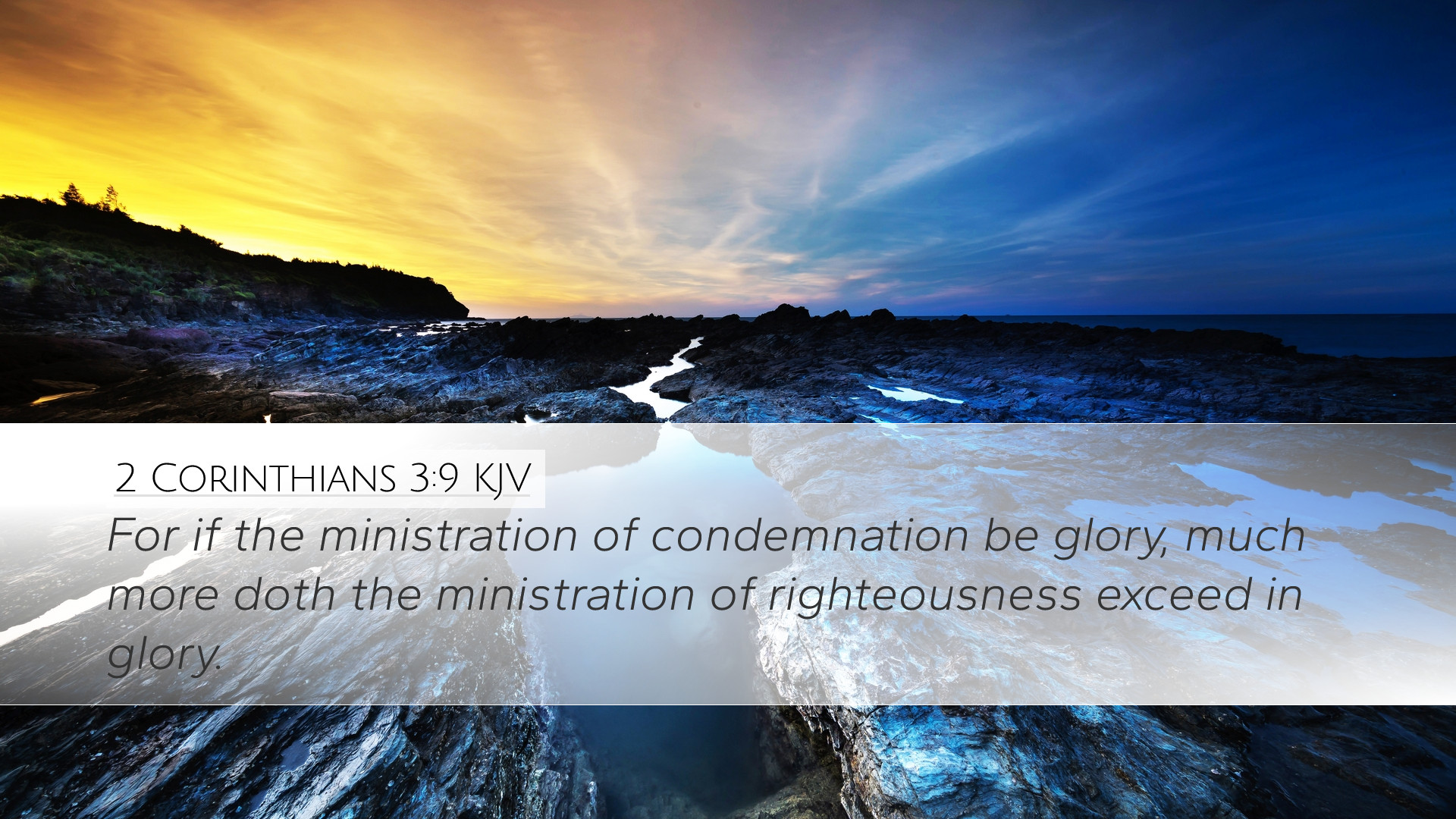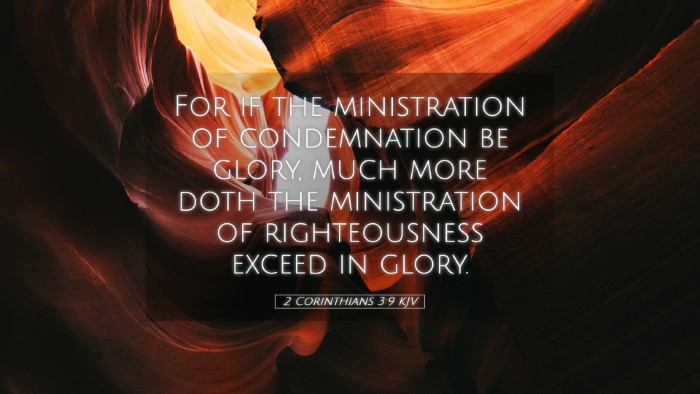Commentary on 2 Corinthians 3:9
2 Corinthians 3:9 states, "For if the ministry of condemnation had glory, the ministry of righteousness exceeds much more in glory." This verse highlights a profound theological contrast that the Apostle Paul is making between the old covenant and the new covenant, including implications for believers and their ministries.
Contextual Overview
In 2 Corinthians 3, Paul reflects on the nature of his ministry compared to those of the old covenant. He emphasizes the transformative power of the new covenant through Christ, which brings life and righteousness, contrasting it with the old covenant established through Moses, which is associated with condemnation and death.
The Ministry of Condemnation
Paul refers to the "ministry of condemnation," which is understood to be the ministry of the Law given to Moses. This ministry was glorious in its own right, as it provided the Israelites with God’s standards and revealed His holiness. Matthew Henry describes this aspect of the Law as "being administered with great majesty and terror," emphasizing its divine origin and seriousness.
- Understanding Condemnation: The Law's primary role was to delineate sin, thus bringing awareness of wrongdoing (Romans 7:7). It served as a mirror reflecting humanity’s sinful state, leading to condemnation.
- Glory of the Old Covenant: Despite its negative aspects, the old covenant had a measure of glory. Albert Barnes notes, "It was accompanied by a visible exhibition of the divine presence, with the cloud and fire, and the shining of Moses' face, which showed the glory of the divine." This glory, however, was temporary and fading.
The Ministry of Righteousness
In contrast, the "ministry of righteousness" refers to the new covenant established through Jesus Christ. This ministry is characterized not only by grace but also by life. Adam Clarke articulates that this ministry "not only brings righteousness to the sinner but also transforms the sinner into a righteous person through faith."
- Exceeding Glory: Paul asserts that the glory of the new covenant far exceeds that of the old. This is partly due to the permanence of Christ’s redemptive work, as the new covenant doesn't fade but is eternally effective (Hebrews 8:6).
- Transformative Power: The new covenant empowers believers to live righteously, producing a transformation not achievable under the Law. This is a theme emphasized in Romans 8:1-4, where believers walk according to the Spirit rather than the flesh.
Theological Implications
This verse encapsulates significant theological truths regarding the nature of God's promises and how they are manifested through Christ’s ministry.
- Contrast of Covenants: The contrast between condemnation and righteousness underlines the progression from Law to Grace. The old covenant demonstrates God's justice, while the new covenant showcases His grace.
- Implications for Ministry: For pastors and ministry leaders, understanding this distinction encourages a focus on preaching grace and righteousness that is available in Christ instead of merely the sins that the Law highlights.
- Encouragement for Believers: Believers are assured that in Christ, they stand justified and righteous, thus they are called to live out this righteousness in their daily lives.
Practical Applications
In light of this theological insight, several practical applications arise for believers:
- Living in Grace: Understanding the grace of the new covenant encourages believers to live in freedom rather than under fear of condemnation, fostering a relationship with God built on love rather than mere obligation.
- Encouragement in Sharing the Gospel: The exceeding glory of righteousness motivates believers to share the gospel, offering the hope and transformative power of Christ to those still under the weight of the law.
- Reflection on Ministry Focus: Pastors and leaders should prioritize messages of grace, righteousness, and the life-giving power that comes from the new covenant, which starkly contrasts with the condemnation of the old covenant.
Conclusion
The richness of 2 Corinthians 3:9 serves as a reminder of the radical shift brought about through Christ. While the old covenant was indeed glorious and served its purpose, the new covenant, characterized by grace and righteousness, surpasses it immeasurably. For pastors, students, and theologians, this truth is not merely theological but profoundly practical, shaping how they approach ministry and embody faith in Christ.


